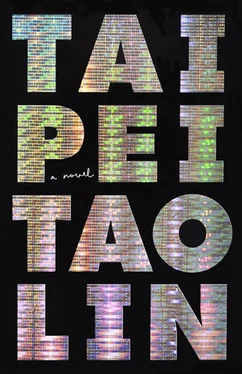He kept his eyes pressurelessly closed and didn’t move, wanting to return — without yet knowing who or what he was — to sleep, where he could intensify and prolong and explore what he residually felt and was uncontrollably forgetting, but was already alert, in concrete reality, to a degree that his stillness, on his queen-size mattress, felt like a kind of hiding. He stared at the backs of his eyelids with motionless eyeballs, slightly feigning not knowing what he was looking at — which also felt like a kind of hiding — and gradually discerned that he was in Brooklyn, on an aberrantly colder day in late March, in the two-person apartment, in a four-story house, where he had moved, a few weeks after returning from Taiwan, because Kyle and Gabby had wanted more space, to “save their relationship.”
It was spring, not winter or autumn, Paul thought with some lingering confusion. He listened to the layered murmur of wind against leaves, familiarly and gently disorienting as a terrestrial sound track, reminding people of their own lives, then opened his MacBook — sideways, like a hardcover book — and looked at the internet, lying on his side, with his right ear pressed into his pillow, as if, unable to return to sleep, at least in position to hear what, in his absence, might be happening there.
That night — after leaving his room at dusk, then “working on things” in an underground computer lab in Bobst Library, as he did most days — Paul became “completely lost,” he repeatedly thought, in a tundra-like area of Brooklyn for around twenty minutes before unexpectedly arriving at the arts space hosting the panel discussion, on the topic of self-publishing, he’d agreed to attend with his literary acquaintance Anton, 23, who was visiting from Norway. Paul began, at some point, during the ninety-minute discussion, to feel a mocking, sitcom-like conviction that, for him, “too many years had passed” since college — that without education’s season-backed, elaborately subdivided, continuous structure, traceable numerically backward almost to birth, connecting a life in that direction, he was becoming isolated and unexplainable as one of those mysterious phenomena, contained within informational boxes, in picture-heavy books on natural history, which he would’ve felt scared, as a child, if he was alone in a dark room, to think about for too long. After the ninety-minute discussion, which seemed unanimously in favor of self-publishing, the audience was instructed, somewhat anticlimactically, to bring their folding chairs to another room and lean them against a wall, then Paul and Anton stood waiting for Juan, 24, an MFA student in fiction at NYU, who’d wanted to eat with them but was talking to an attractive woman.
“What should we do?” said Paul.
“I don’t know,” said Anton in a quiet monotone.
They decided to leave in three minutes, at 9:01. This was Paul’s second or third social situation involving more than one person, excluding himself, since returning from Taiwan, two months ago. His only regular communication since his relationship with Michelle ended three and a half months ago was emails and Gmail chats with Charles, 25, who lived in Seattle with his girlfriend and who had sold most of his belongings, the past few months, in preparation to leave America indefinitely to travel alone in Mexico — and eventually South America — because he felt “alienated,” he’d said.
“It’s 9:04,” said Anton.
“What should we do?”
“We could wait until 9:10.”
“I don’t know,” said Paul grinning. “I don’t know. Let’s just leave now, I think.” He didn’t move for around ten seconds. “We should go,” he said, and after a few seconds moved toward the exit, feeling slightly oxygen deprived.
“Hey,” said Juan running. “Are you guys going to eat now?”
“Yeah,” said Paul, and glanced, for some reason, at Anton, whose eyes, behind medium-thick lenses, appeared farther away but of higher resolution than the rest of his face.
“Sorry,” said Juan looking at Anton.
“It’s called Pacifico,” said Paul outside. “The address is 97 Smith.”
“I think Pacific is this way,” said Juan.
“Pacifico,” said Paul looking at Anton, who seemed to be grinning.
“This way,” said Juan rolling his bike beside him.
“Wait,” said Paul. “The restaurant is called Pacifico.”
“I kept thinking it was on Pacific,” said Juan with a serious expression.
“No,” said Paul. “But it’s probably near Pacific.”
In Pacifico, a dungeon-like Mexican restaurant, Paul stared at his menu, waiting for his eyes to adjust in the diffuse lighting. He was aware of Anton and Juan, across the table, also holding and staring at menus. When their burritos arrived he noticed, with preemptively suppressed interpretation, that his, of the three, appeared slightly darkest. Then a large group of males from the panel discussion entered and seated themselves in a swarming and disorganized manner, which Paul experienced as a parody of surrounding a heterosexual, single male with a variety of ethnicities and ages of males.
While idly eating the salad-y remains of his burrito with a fork, around twenty minutes later, Paul became aware of himself analyzing when he should’ve left. He vaguely traced back the night and concluded he should’ve left when, on his way to the venue, he had been “completely lost.” He allowed himself to consider earlier opportunities, mostly for something to do, and discerned after a brief sensation of helplessness — like if he’d divided 900 by itself and wanted the calculator to answer 494/494 or 63/63—that, in terms of leaving this social situation, he shouldn’t have been born. He suppressed a grin, then channeled the impulse into the formation of what he thought of as a nervous smile and stood and mumbled “I’m going to sleep now” and “nice seeing you” until he was outside, where it was windy and cold.
He walked toward an F train station, aware of the strangeness of clouds at night — their enveloped flatness and dimensional vagueness, shifting and osmotic as some advanced form of gaseous amoeba — and remembered when he got lodged in an upside-down wood stool, as a small child, in Florida. His father had sawed off two rungs with an enormous, floppy, serrated blade while his mother, alternately grinning and intensely focused, careful not to allow her personal experience of the event impair its documentation, photographed them from different angles, sometimes directing their attention to the camera, like in a photo shoot.
The next two weeks Paul gradually began to view the five months until September, when his second novel would be published and he would go on a two-month book tour, as an “interim period,” during which he would mostly be alone, “calmly organizing things,” he said in an email to his mother. He had already been mostly alone, he knew, since returning from Taiwan, but in a vague way, often wondering if he should’ve gone to whatever social gathering. Now if he felt urges to socialize, to meet a romantic prospect, he would simply relocate them, without further consideration, beyond the “interim period,” when he would be extremely social, he envisioned. Until then he would calmly focus on being productive in a low-level manner, finding to-do lists and unfinished projects in his Gmail account and further organizing, working on, or deleting them, for example.
In early April he got an email from Traci asking if she could email-interview him for a website. After a few emails Paul asked Traci, whom he now reasonably, he felt, viewed as a romantic prospect, if she wanted to meet for dinner. At an Asian fusion restaurant, which Traci had suggested, they talked for around fifteen minutes, during which Paul’s interest steadily increased, before Traci mentioned living with her boyfriend. Paul was aware of the ice hockey game on the flat-screen TV attached to a wall, of the disparity between Thai food and ice hockey, as he slowly said “is, um, is it a studio apartment?”
Читать дальше












